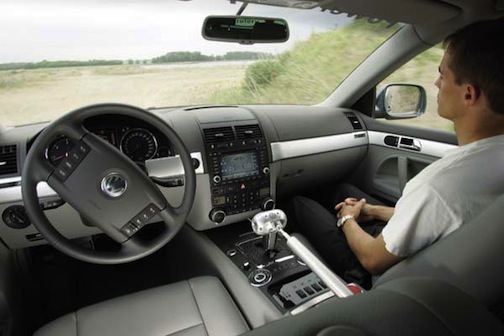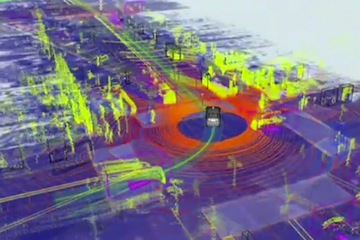Google Wants 1 Million Driverless Miles
Posted on May 19, 2016 in Safety | 1 comment

Remember when Google was just a search engine?
I still remember the first time I saw the Google homepage. It was in 2001, and I worked at an ad agency. One of the hip designers had the sparse, mystifying, cryptic page constantly displayed on one of his Power Mac monitors. I looked at that page and wondered what it was. I wondered what would happen if I were to click the “I’m Feeling Lucky” button.
I’d never seen a website so devoid of content and wondered if I’d be able to use it, if I was even allowed to, or if it was just for people who had been given specific instructions on how to operate the instruction-less web tool.
Then I got brave and searched my first Google search. I didn’t click “I’m Feeling Lucky,” because I wasn’t, plus I didn’t know what would happen if I did.
It all seems so silly now, especially since all of humanity “Googles” things nearly as often as we take a breath. (Have you tried the “Chuck Norris” I’m Feeling Lucky search? Funny stuff.)
My point is, Google was the coolest, most useful website ever created. But that was before Google got too big and earned more money that it knows what to do with. Now, Google is meddling in things it shouldn’t be messing with. Smart phones are one, I think. The other is driving.

Google co-founder Sergey Brinannounced that Google’s next goal for its driverless cars is to go 1 million miles without driver intervention. According to Brin, the company has already “driven” over 1,000 miles without any driver involvement.
We’ve reported here before on Google’s driverless cars. With some limited human input and the power of Google’s software, the cars have gone about 160,000 miles.
Google would like to reach a point where it’s legal for driverless cars to flow alongside everyday traffic. Before the technology can be marketable, though, Google says it needs to be developed to a point where human drivers can ignore the road entirely.
And that, frankly, sucks. Why would we want to ignore the road? The road is what gives us freedom and the choices to go wherever we please. Our lives are becoming so dictated by technology that we’re going to lose the great spontaneity that makes us interesting. Driverless cars will just contribute to creating a society where humans are mindless beings shuffled between locations while having conversations with the computerized woman in our iPhones. Or worse.
Maybe Google should use all the money it’s dumping into driverless cars for initiatives to get people interacting with one another. If it wants to influence the automotive realm, maybe it could contribute to racing safety.
It just seems like Google could do something great with its influence and its limitless cash. But driverless cars? They don’t make me feel lucky.





.gif)


Having been involved in some of the first experiments in autonomous vehicles, including such technology as drive by wire, lane keeping and departure warning, active steering, radar braking, I can tell you something that google won’t: They only tell you about the success, and they don’t tell you how they generate these driverless miles. Of course they hand select the roads and the testing conditions, and don’t tell you about the problems. And are they truly driverless miles? Having someone sitting there ready to take over when the system screws up is not truly driverless. It’s an intersting technology, but given that around 35,000 Amercians die in accidents every year, not to mention the hundreds of thousands of injuries and millions of fender benders, I’d say operating a vehicle in real conditions is a pretty complex task. Since humans have some diffculty with driving, even though they possess a processing and optical system that is far more complex and capable than anything you can duplicate with a machine. There are some opportunities for some level of automated vehicle guidance, such as expressways or trunklines.